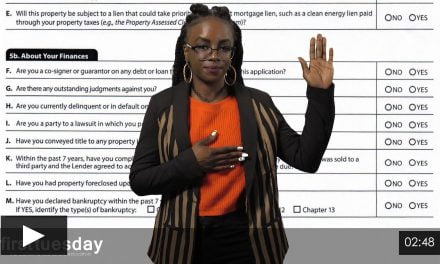Question: Can a licensed broker or sales agent purchase a property as a principal and receive a brokerage fee on the sale?
Answer: First, a basic rule: A real estate licensee who acts solely as a principal when buying or selling property need not disclose the existence of his real estate license; he is not acting in the capacity of a licensed broker (or a licensed agent employed by a broker) in expectation of a fee.
However, a licensee (broker or agent) acting solely as a principal who does not immediately disclose to all parties involved in the transaction his intention to use his licensing status to share in the broker fees upon his first inquiry for more property information may not later demand a fee on the sale.
Simply put, a licensee who delays disclosure of his intention to share in the fee misrepresents the nature of his involvement in the transaction. If all parties involved are not aware of his role as licensee or his claim to be participating as one, he certainly does not fulfill the general agency duties he owes to all parties involved. It is, in a word, deception. [For more information about license disclosure, see the July 2011 first tuesday article, The license disclosure myth.]
A licensee acting as a buyer and in the same transaction timely demanding he share in the fee paid to the listing broker subjects himself to real estate agency duties and obligations. Once a licensee holds himself out as participating as an agent in a transaction expecting to receive a fee, the licensee becomes responsible to fulfill general agency duties to the other party. In turn, the existence of his license and the amount of the fee received must be disclosed to the seller (or buyer) paying the fee.
Consider a broker who sells a residence he owns. The property is in violation of safety requirements for occupancy due to defects in the foundation known to the broker. The broker does not tell the buyer about the foundation defects.
Out of the gross sales proceeds the broker receives on the sale, the broker-seller instructs escrow to pay him a brokerage fee. He claims to be exclusively representing himself (although negotiating on one’s own behalf is never an agency and does not require a license).
The buyer later discovers he must demolish the residence and rebuild it due to the defective foundation. The buyer obtains a money judgment against the broker as a licensee for breach of his general agency duty owed to all parties in a real estate transaction to disclose known property defects that caused the buyer to take a loss.
The broker is unable (or unwilling) to pay the money judgment. The buyer seeks payment from the Department of Real Estate (DRE) Recovery Fund.
Recovery is received from the DRE Recovery Fund since the broker held himself out as acting as a real estate broker in the transaction — he received a fee. The broker’s license is then suspended. Before the broker can reactivate his license, he must now reimburse the DRE Recovery Fund. [Prichard v. Reitz (1986) 178 CA3rd 465]
Further, a broker-buyer acting as both principal and agent in a transaction must be sure to disclose his expectation of a fee — a kickback to the buyer — to any lender providing purchase-assist financing to fund the transaction. If the broker makes a down payment for purchase of a property, then receives a fee from the seller or the seller’s broker, he is essentially getting a portion of his down payment back.
Thus, the broker is paying a smaller down payment than was disclosed to the lender — a fact that may well affect the terms of his mortgage when disclosed. The Federal Housing Administration (FHA) provides for a broker/agent to use the fee as a downpayment so long as it is disclosed and is a reasonable amount for the price paid.
Worse yet, the property interest of the broker is a capital asset subject to capital gains treatment when buying or selling. And part of that gain is deliberately (and unintelligently) converted into ordinary income when declared a fee for acting as an agent.
So what should a licensee acting as a seller do if he wishes to use the existence of his licensing status to cut a better deal financially?
Upfront, when the buyer’s broker (or agent) contacts him for more information on the property — the moment negotiations have begun — the licensee-seller must advise the buyer’s broker of the amount of the reduced fee the buyer’s broker will be paid, instead of agreeing to share a full fee with the buyer’s broker upon closing.
When acting as a buyer, a licensee should simply reduce the price he offers by the amount of the fee he would receive as a buyer’s agent, setting the fee due the listing broker at the amount remaining. Thus, in both cases, the fee avoided and the price adjustment is a wash.
Recommendations: A principal engaging an agent on his own behalf to be involved in the negotiations — investigations and escrow — seems to obtain better results (including price) than when going it alone with no buffer between himself and the other party and that party’s broker.















I have a question, while one is a principle in a transaction, does one require a brokers license, or is one exempt from needing a license as soon as one is a broker?
I have a question, while one is a principle in a transaction, does one require a brokers license, or is one exempt from needing a license as soon as one is a principle?
Apologies, the above question is the correct one.
Tim,
Thank you for your inquiry! No license is required to be a principal in a transaction, unless one is also acting as a broker or an agent in that transaction.
Regards,
ft Editorial Staff
You can go to meet with a local agent, but do not expect mlrecias. They do not make the final decisions themselves. They submit your application to the insurance company, which is located somewhere else, and makes the decision. You still have to wait the same amount of time (longer if the agent is slow to send the application), and you are just as likely to be rejected. The agent cannot give you a counter-offer, for the simple reason that the agents cannot make, accept, or reject any offers; they just process paperwork for an insurance company located elsewhere which makes all the decisions. The only difference is that agents use handwritten forms, and if the insurance company cannot read your handwriting, then you will have to wait longer or redo the form. Websites have you type everything, so there are no handwriting problems.Before the Internet, they were turned down, they were not given counter-offers, and they had to wait much longer than day/weeks. They had to wait for months, and they still got the same result.
Hey! The answer is YES – as long as it is disclosed.
Jeez! 16 paragraphs to answer a simple question.
Whether to take a commission when acting as a principal in a purchase? That is the question that was asked above. Say it is a $500,000 purchase with 50/50 split of a 6% listing. The selling broker would be entitled to a $15,000 commission in a normal transaction. If I were the selling broker and the listing broker and the seller would agree to this idea? Instead of taking a $15,000 commission that would be subject to income taxes and self employment taxes, why not have the seller reduce the price by $15,000, pay the selling broker a full $15,000. If the seller would have to pay any taxes on the sale of the property, that would reduce his ultimate tax liability. Now I have never heard of this being done and I am not sure if it would fly by the IRS and FTB but it MIGHT be a way to reduce taxes for the seller AND the Broker buyer? Correct me if I am wrong?